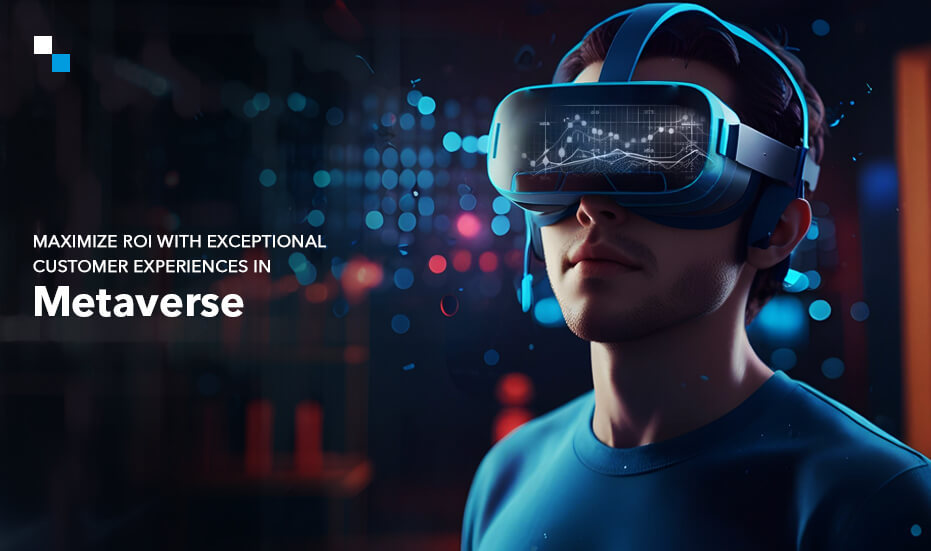
How can the Metaverse Revolutionize the Food Industry
February 14, 2024
12 Best Features To Be Included in an NFT Marketplace For Artists
February 15, 2024You might be aware of the hype around the metaverse, but how is it connected to the real estate? Believe it or not, people are buying virtual lands inside the metaverse. Isn’t it exciting? Metaverse real estate platform development has changed the way people claim their ownership in this digital age. Building cutting-edge metaverse platforms redefines how properties are bought, sold, and experienced, offering immense opportunities for investors and users alike.
Metaverse Platforms: Reshaping Real Estate
Metaverse platforms have garnered significant attention in recent times and are revolutionizing various aspects of our lives, including real estate. A metaverse real estate development company can create digital spaces, powered by virtual reality (VR) and augmented reality (AR) technologies, to provide immersive experiences for users, as they can explore virtual worlds through avatars, socialize, and interact with virtual objects and properties.
Here’s why you should consider embracing this innovative approach to property development:
1. Limitless Possibilities
The metaverse offers an expansive playground for real estate development, where the boundaries of physical limitations are virtually non-existent. Through immersive virtual environments, you can design and shape properties without the constraints posed by traditional construction techniques.
2. Enhanced Collaboration
Bid adieu to tedious and time-consuming coordination among different teams. Metaverse real estate development services provide a collaborative platform where architects, designers, and developers can seamlessly work together, sharing ideas and making real-time modifications to create the perfect property.
3. Personalized Experiences
Imagine being able to walk through a property before it’s even built. With Metaverse real estate platform development, you can offer potential buyers the opportunity to explore and experience their dream home virtually, customizing every aspect to meet their specific needs and preferences.
4. Cost Efficiency
Metaverse real estate development can significantly lower costs associated with property development by reducing the need for physical construction materials and labor. It allows for more affordable housing options, making the dream of homeownership accessible to a wider audience.
5. Environmental Sustainability
As the world grapples with climate change, a metaverse real estate development company can offer a sustainable solution. This innovative approach promotes environmental preservation and responsible resource consumption by minimizing the ecological footprint associated with traditional construction methods.
6. Adaptive Real Estate Market
The metaverse revolutionizes the real estate market by introducing dynamic and adaptable properties. With the ability to easily modify and update digital spaces, you can keep up with changing market demands and preferences, ensuring that your properties remain relevant and attractive to potential buyers.
7. Endless Entertainment Potential
Real estate development in the metaverse isn’t just limited to housing. It opens up endless possibilities for recreational spaces, gaming arenas, and virtual events, creating a vibrant and thriving ecosystem that attracts and engages users from all walks of life.
How Metaverse Real Estate Platforms Work?
Metaverse real estate platforms function as virtual marketplaces, enabling users to buy, sell, and own virtual properties within the metaverse. These platforms leverage blockchain technology to ensure transparency, security, and authenticity in property transactions. Users can purchase digital land, buildings, or even entire virtual cities, which can be appreciated over time.
Here’s how it all works:
1. Digital Properties
Metaverse Real Estate Platforms operate in a virtual space, offering users the opportunity to own and trade digital properties such as virtual land, buildings, and other imaginative creations.
2. Blockchain Technology
Metaverse real estate development services utilize blockchain technology to ensure transparency, security, and decentralization. Every transaction, ownership record, and property details are stored on the blockchain, making it accessible to all participants in the metaverse.
3. NFTs and Ownership
NFTs play a crucial role in metaverse real estate platforms. Each digital property is represented by a unique NFT, providing proof of ownership and authenticity. NFTs can be bought and sold, allowing users to build their digital property portfolios.
4. Virtual Marketplaces
Just like traditional real estate, virtual marketplaces exist within these platforms. Users can browse through a wide array of digital properties, each with its unique attributes and value. Prices are determined based on factors like location, size, popularity, and surrounding virtual amenities.
5. Virtual Collaboration
Metaverse real estate platforms also encourage collaboration and creativity among users. Individuals can team up to develop and design their digital properties, bringing them to life with immersive experiences and user-generated content.
6. Monetary Benefits
Owning valuable digital properties can be financially rewarding. Owners can monetize their digital real estate by renting or leasing it to other users, hosting virtual events, or even selling it at a higher price in the future.
7. Social Communities
Lastly, these platforms foster social communities, where users can connect, interact, and explore the metaverse together. It’s not just about buying and selling properties; it’s also about building connections, having fun, and experiencing the boundless possibilities of the digital realm.

Factors that Influence the Value of Metaverse Real Estate
1. Location
In both the physical world and the metaverse, location plays a crucial role in determining the value of real estate. In the metaverse, certain areas may be more popular, attracting a larger number of users and creating a thriving community. These high-traffic locations become prime real estate and are often priced accordingly. On the other hand, less popular or remote areas may have lower demand and therefore lower value.
2. Scarcity of Land
Land scarcity is another significant factor that impacts the value of metaverse real estate. Just like in the physical world, limited supply and high demand drive up prices. In the metaverse, the amount of available land is finite, making it valuable. Additionally, some Metaverse real estate platform development experts implement scarcity by limiting the total number of parcels or regions that can be owned, further driving up the value of those land holdings.
3. Infrastructure and Development
The infrastructure and development within a metaverse also affect the value of real estate. Areas with well-maintained and aesthetically pleasing environments tend to attract more users, thereby increasing the value of the properties within. Additionally, the presence of amenities such as virtual shopping centers, entertainment venues, and educational institutions can significantly boost the desirability and value of real estate in the metaverse.
4. Interoperability and Cross-Platform Functionality
One of the key factors impacting the value of metaverse real estate is its interoperability and cross-platform functionality. The ability to seamlessly move assets and avatars across different metaverse platforms increases the value of real estate as it opens up more opportunities for interaction and commerce. Metaverses that offer robust cross-platform functionality are likely to attract more users, resulting in higher demand and increased value for properties within those metaverses.
5. Integration with Blockchain Technology
Blockchain technology plays a pivotal role in the metaverse by enabling secure ownership and transfer of digital assets. Metaverse platforms that integrate blockchain technology offer enhanced security and transparency, which in turn increases the perceived value of real estate within those platforms. Blockchain integration also opens up opportunities for tokenization of assets, allowing for fractional ownership and trading, further increasing the liquidity and value of metaverse real estate.
Top Metaverse Real Estate Platforms to Watch Out
- Decentraland: Known as the “first fully decentralized virtual world,” Decentraland allows users to buy and sell virtual land, create and monetize content, and interact with other users in a vibrant metaverse environment.
- Cryptovoxels: This Ethereum-based platform enables users to own and develop virtual properties, organize events, and showcase digital art. Cryptovoxels’ emphasis on creative freedom and collaboration makes it a popular choice among artists and creators.
- The Sandbox: Built on blockchain technology, The Sandbox offers a user-friendly platform where users can create, own, and monetize virtual assets and experiences. It empowers users with robust tools to shape their own virtual world.
Get Obligation Free Quote
[widget id=”custom_html-3″]
Benefits of Metaverse Real Estate Platform Development
Metaverse real estate platform development presents numerous advantages for both developers and users. These include:
The Benefits for Real Estate Developers
1. Expanding Reach and Access
Metaverse real estate platforms enable developers to showcase their properties to a global audience. By eliminating geographical constraints, developers can attract potential buyers from anywhere in the world. This expanded reach increases the chances of finding the right buyer for a property, leading to faster sales and higher profits.
2. Cost and Time Savings
Conducting physical property viewings can be time-consuming and expensive for developers. The developers from a metaverse real estate development company can save both time and money by offering virtual tours of the properties. Potential buyers can explore multiple properties without leaving their homes, eliminating the need for travel expenses and reducing the time required for site visits.
3. Enhanced Visualization and Experience
Real estate developers can leverage the power of virtual reality to create realistic and immersive experiences for potential buyers. By showcasing properties in a virtual environment, developers can provide an in-depth visualization of the property’s layout, design, and amenities. This enhanced visualization helps buyers make more informed decisions and increases their confidence in the property.
The Benefits for Property Buyers
1. Convenience and Flexibility
Metaverse real estate platforms offer convenience and flexibility to property buyers. Instead of visiting multiple properties physically, buyers can explore numerous properties from the comfort of their homes. This convenience saves time and effort, especially for buyers who are located far away from the properties they are interested in.
2. Risk-Free Property Exploration
Virtual tours on metaverse real estate platforms allow buyers to explore properties without the risk of making a purchase commitment. Buyers can navigate through properties, examine details, and get a feel for the space without any pressure. This risk-free exploration helps buyers narrow down their options and make informed decisions.
3. Time Efficiency
Metaverse real estate platforms enable buyers to make better use of their time by streamlining the property search process. Instead of spending hours visiting properties physically, buyers can view multiple properties virtually in a short amount of time. This increased efficiency speeds up the property buying journey and helps buyers find their dream homes more quickly.
Key Points for Metaverse Real Estate Development
When venturing into metaverse real estate development services, it is crucial to keep the following key points in mind:
1. Integration of Blockchain
Leveraging blockchain technology ensures transparency, security, and immutability of property ownership and transactions. Smart contracts can automate processes and enable fractional ownership of virtual properties.
2. Seamless User Experience
A user-friendly interface and smooth navigation are essential for attracting and retaining users. Focus on creating an intuitive and immersive experience that encourages users to explore and interact within the virtual world.
3. Adaptable Monetization Models
Consider various monetization models, including virtual asset sales, rental income, advertising, and in-platform purchases. Providing options for users to generate income from their virtual properties can enhance their overall experience.
Conclusion
The age of metaverse real estate platforms has arrived, promising a transformative experience for property ownership in the digital realm. As these platforms gain traction, the value of virtual assets will soar, offering attractive investment opportunities. Metaverse real estate development services can unlock the full potential of metaverse real estate by embracing blockchain technology, prioritizing user experience, and focusing on monetization strategies.
Partnering with a seasoned metaverse real estate development company like Antier can provide the expertise needed to capitalize on this fast-evolving landscape. Embrace the metaverse revolution and shape the future of property ownership in the digital age.



